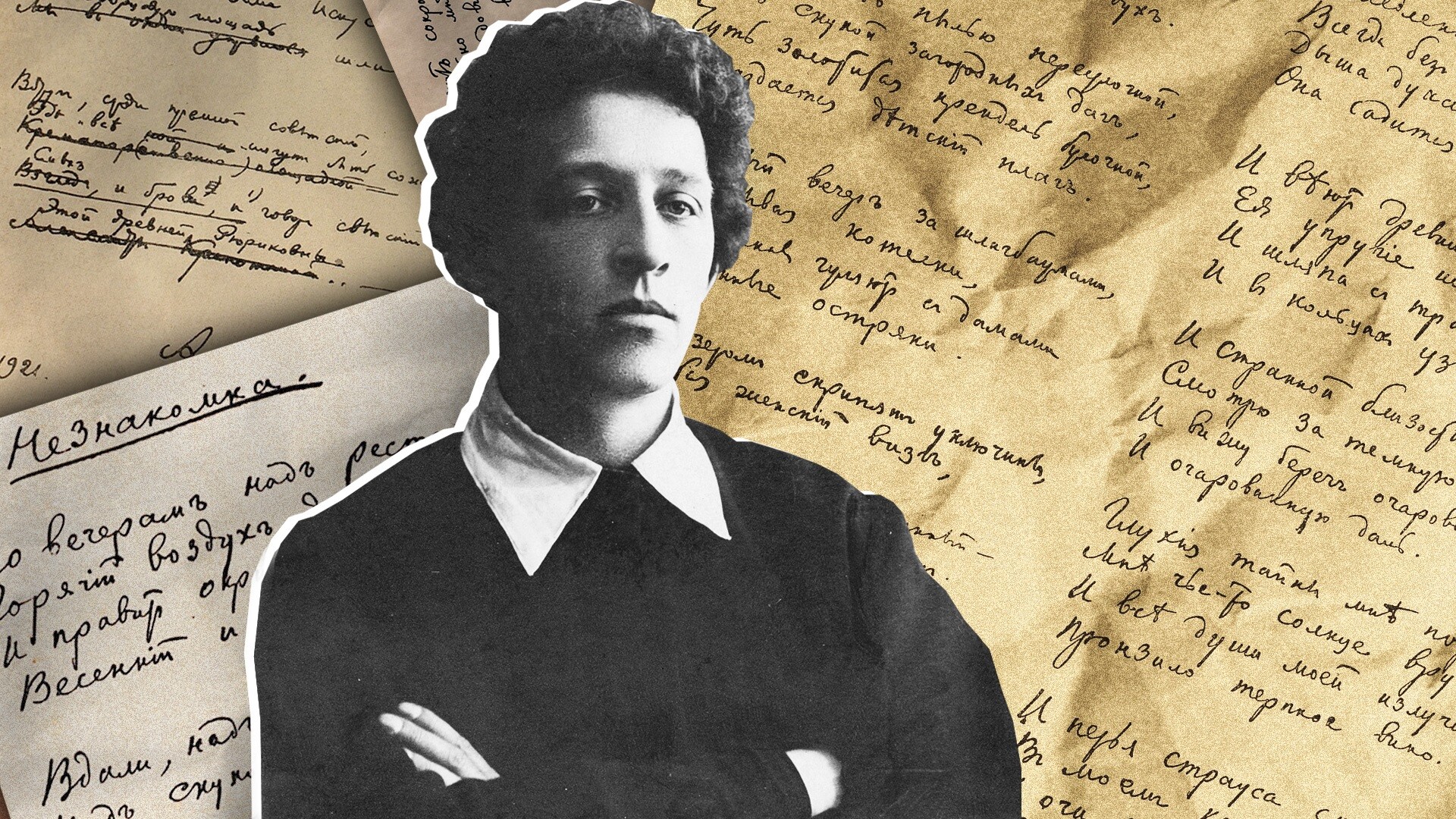5 poems by Alexander Blok you should know

1. ‘I have a premonition of You. The years go by’
A refined lyric poet and Romantic, Blok wrote a large cycle of poems titled ‘Verses about the Beautiful Lady’. The poet was influenced by the philosophy of his contemporary Vladimir Solovyov and his concept of the ‘Eternal Feminine’ - Blok’s ‘Beautiful Lady’ was not simply a woman, but a cosmic and metaphysical concept. An ideal that was out of reach.
Blok wrote one of the key poems of the cycle - ‘I have a premonition of You. The years go by’ - in 1901. He was 21, but was already grieving that the years were passing and he had still not met his ideal woman. He only had a presentiment of her coming - “in love and longing”, as he put it, quoting Solovyov. Well, he was right in his premonition - in 1903, he married Lyubov Mendeleeva, the daughter of the famous chemist, who lived on a neighboring estate and whom he had known since childhood.
“I have a premonition of You. The years go by -
Always one image and likeness, I have a premonition of You.”
2. ‘The night, a street, a lamp, a pharmacy’
This short poem, written in 1912, can be cited in full. Very many people in Russia know it by heart.
“The night, a street, a lamp, a pharmacy,
A senseless, murky light.
Live a quarter century more,
And all will be the same. There’s no way out.
You’ll die and start again afresh
And all will recur as of old:
The night, the icy canal’s rippled surface,
A pharmacy, a street, a lamp.”

As a real Russian writer, Blok could not fail to ponder the meaning of life. On the one hand, his verse is about the fleetingness of life, in which everything leads to death. But, at the same time, it is about the closed circle of life from which there is no escape and about man (and more widely, the soul) being doomed to repeat one and the same actions, to be born and to die. As a result, even a voluntary exit from life offers no escape from this circular destiny.
3. ‘Russia’
Almost every Russian high school pupil has written an essay on ‘The image of the Motherland in Blok’s verse’. The poet did, in fact, write and think a very great deal about Russia. For him, it was not just the country in which he lived, but a living being with which he was inextricably involved.
In 1908, Blok wrote the poem ‘Russia’, in which Rus’ appears to him as an eternally beautiful woman, who surrenders her beauty to a sorcerer. According to Blok, however, this cannot bring about her downfall.
“Let him entice and betray you,
You will not perish or die,
And only a look of care will cloud
The beauty of your features…
What of it? With one care more -
The river runs noisier by a teardrop
But you are the same as before - a forest, a field
And a patterned shawl down to the brows of your eyes…”
4. ‘The Scythians’
“You are millions. We are hordes and hordes and hordes.
Just try to pick a fight with us!
Yes, we are Scythians! Yes, we are Asiatics,
With slanted, avaricious eyes!”
Blok wrote the above poem in January 1918, when news had broken of the resumption of peace talks in World War I. What is more, the conflagration of the Revolution and Civil War was raging in Russia.
The verse begins somewhat belligerently - as if the Russians were a mighty Oriental force of nature that could sweep aside everything in its path. But Blok is referring to Russia as a barrier shielding Europe from Asia, and as a culture that has incorporated a variety of influences from both West and East.

And ultimately the poet calls for peace.
“Join us! Turn from the horrors of war
And come into our peaceful embrace!
Before it's too late - sheathe the old sword,
Comrades! Then we'll be brothers!”
It might be noted that Blok himself was not too enamored of ‘The Scythians’, which, because of its topical references and incisive language, ended up being widely quoted. He believed that poetry should be above political manifestos.
5. ‘The Twelve’
Blok was initially quite enthusiastic about the 1917 Revolution, seeing it as an opportunity for the spiritual renewal of society and a chance to build a new life.
In his long poem ‘The Twelve’ (1918), the poet portrays the Revolution as the apocalypse, in which a new world is being born. Havoc, hunger, cold, street robberies and shootings reign in a semi-devastated Petrograd (the name of St. Petersburg in the years 1914-1924). But, Blok welcomes and justifies the collapse of the old world and the triumph of the new elemental forces of revolution.
The protagonists of the poem, 12 Red Army soldiers - 12 “apostles” of the new faith - casually sacrifice human lives in the name of the new era. “Let’s fire a shot at Holy Russia - / At plain old, / Wooden-hutted, /Fat-assed Russia!” They cry.
Jesus Christ goes in front of the Red Army men “in a white wreath” of roses. There are different interpretations of this image - either Christ is blessing the Revolution and is leading the way for it or the Red Army soldiers are driving him away and overthrowing religious faith.
In 1920-1921, Blok grew disillusioned with the Revolution, stopped writing verse and effectively died of starvation.


